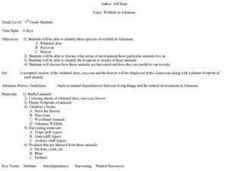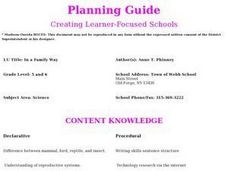Curated OER
How do new species form?
Tenth graders conduct a critical analysis of current evolutionary concepts. They describe how scientists continue to investigate theories. Students examine examples with experimental data that suggest alternative methods of species...
Curated OER
Biodiversity Bird Hunt
Learners examine the influence of biodiversity on human culture through the use of birds. They brainstorm words that come to mind when they think of human cultures. They describe ways that human culture and biodiversity are linked.
Curated OER
Natural Selection Simulation
Students simulate the changes in a natural population of birds or other species. They establish baseline data of population fluctuation for a closed population with a stable food supply. They graph the data to complete their mutations.
Curated OER
Wildlife in Arkansas
First graders identify three species of wildlife in Arkansas. They discuss the environment in which the whitetail deer, raccoon, and beaver live in. They identify the footprints of each animal and discuss how the animals are harvested...
Curated OER
Sampling Variation in a Natural Population
Students examine the phenotypic variation within a natural population of a single species. They collect data on the species and analyze the data using statistical/spreadsheet software. Students interpret their results and present their...
Curated OER
Learning To Identify Insects
Learners utilize the Internet to locate a variety of insects. The pictures located are compared and contrasted and placed into a book which is published by the class.
Curated OER
Paleoecology of "Fossilized" Owl Pellets
Learners examine fossilized owl pellets to determine how a species environmental preferences allow us to reconstruct probable past environments. Differences in anatomy are used to identify species in this lesson.
Curated OER
Show Some Backbone and Teach Invertebrates
Fifth graders identify two similarities and two differences between two phyla, assign fictitious invertebrate to its phylum and explain why it belongs in that grouping, and construct member of given phylum and explain why it should be...
Curated OER
In a Family Way
Students research a rare species of animals that are a step away from the well known animals of our zoos. They create a mobile which displays the geography, habits, population and habitat of the animals. They draw a picture.
Curated OER
Got the Whole World in My Hands
Students review factors that threaten survival of different species. this lesson is part of a multi-segmented unit on animal survival.
Curated OER
Diversity of Life
Students explore the diversity of life forms and the role that interdependency plays in our world through a mult-segmented unit. This segment introduces the unit.
Curated OER
Natural Selection
Students model natural selection by using various utensils to "capture food" using a simulated species called "Woolybooger's."
Curated OER
The Physiological Tolerance of Two Species of Protozoans
Students examine the differences in pH tolerance between the two species and relate these differences to their respective niches.















